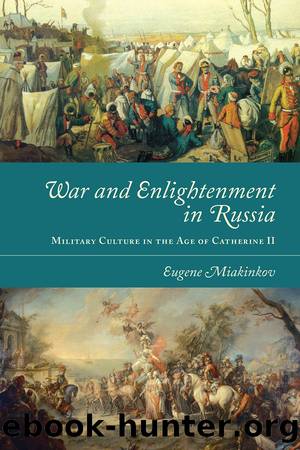War and Enlightenment in Russia by Eugene Miakinkov;

Author:Eugene Miakinkov;
Language: eng
Format: epub
Publisher: University of Toronto Press
The lonely hero had decided to die in battle rather than surrender to the hated Prussians. This was the ideal soldier, the true Russian spirit and the scourge of Russian enemies. Now the recruits knew the true meaning of heroism, now each of them could follow in the steps of this hero. A soldierâs job was to âgo fight, and win,â not to âsurrender alive.â The Epistle was a vehicle for indoctrination â it described the ideal of noble death, self-sacrifice, comradship, and patriotism and in general prescribed the mindset for officers and soldiers. With works like Mamonovâs, military culture was explaining not only soldiersâ responsibilities but also their purpose in life. It was not just instructing soldiers how to behave; it also aimed to condition their mindset.
Indoctrination methods continued to develop in the 1770s and 1780s in at least two ways. Military authors began to create broader personal narratives of belonging for the soldiers and to describe ways for officers to develop stronger bonds between soldiers and themselves through increased interaction. In doing so they began to advance the importance of primary group coherence. Their ideas went beyond passive indoctrination and began to be based increasingly on human psychology. Count Vorontsov wrote that before beginning to indoctrinate soldiers with ideas of honour, service, and loyalty, it was first necessary to exorcise the peasant spirit that remained deeply engrained not just in recruits but even in some of the old soldiers. To remedy this, the young count developed a comprehensive mechanism for eradicating the roots of the civilian past in future soldiers. First, he reminded his officers to read out loud relevant parts of the Military Articles to the soldiers twice a day.83 Second, he followed Suvorovâs strategy and recommended that officers interact more often with their soldiers, especially on an individual basis. This taught recruits military jargon and diminished barriers between officers and soldiers. Frequent interaction also alleviated the anxiety and fear soldiers felt when conversing with their superiors. An officer should not be some rare apparition on the parade ground or a distant and impersonal figure, but an everyday sight in the camp.
Third, it was the officersâ job to tell their men stories about the exploits of famous Russian field marshals to generate pride in and loyalty to imperial arms. To nurture pride and love for their regiment, recruits were told its history, the battles it had fought since its formation, and all the honours it had won. âThis forces each grenadier serving in this regiment to conduct himself honourably and with courage, so that with his behaviour he would not blemish the reputation of the regiment as a whole,â concluded Vorontsov.84 He was convinced that storytelling was the conveyer belt by which ideas about military values and pride of service could be most efficiently delivered to new recruits. Stories about the military exploits of Peter the Great and Field Marshal Rumiantsev and tales of old battles created narratives of belonging to an institution older than the soldiers, and to something that would exist when they were gone.
Download
This site does not store any files on its server. We only index and link to content provided by other sites. Please contact the content providers to delete copyright contents if any and email us, we'll remove relevant links or contents immediately.
| Africa | Americas |
| Arctic & Antarctica | Asia |
| Australia & Oceania | Europe |
| Middle East | Russia |
| United States | World |
| Ancient Civilizations | Military |
| Historical Study & Educational Resources |
Red Famine: Stalin's War on Ukraine by Anne Applebaum(2468)
Chernobyl by Serhii Plokhy(2131)
Midnight in Chernobyl by Adam Higginbotham(2081)
The House of Government by Slezkine Yuri(1846)
Midnight in Chernobyl: The Untold Story of the World's Greatest Nuclear Disaster by Adam Higginbotham(1776)
Red Shambhala by Andrei Znamenski(1752)
The Gulag Archipelago (Vintage Classics) by Aleksandr Solzhenitsyn(1730)
From Cold War to Hot Peace by Michael McFaul(1714)
All the Kremlin's Men by Mikhail Zygar(1700)
Putin's Labyrinth(1661)
Red Notice by Bill Browder(1595)
The Future Is History by Masha Gessen(1592)
From Russia with Lunch by David Smiedt(1552)
A People's Tragedy by Orlando Figes(1545)
The Romanovs by Simon Sebag Montefiore(1490)
How to Tame a Fox (and Build a Dog): Visionary Scientists and a Siberian Tale of Jump-Started Evolution by Lee Alan Dugatkin & Lyudmila Trut(1469)
Putin's Labyrinth: Spies, Murder, and the Dark Heart of the New Russia(1457)
The Lost Spy by Andrew Meier(1399)
Art and Revolution by John Berger(1391)
